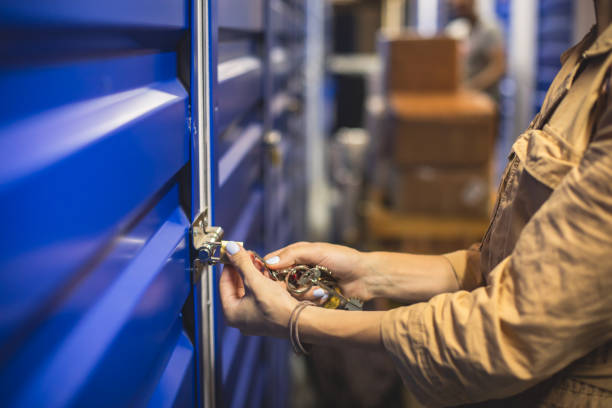Table of Contents
-
Introduction
-
The Importance of Securing Business Storage
-
Types of Business Assets That Need Protection
-
Common Risks and Threats to Business Storage
-
Best Practices to Secure Records and Equipment
-
Understanding Climate Control and Asset Preservation
-
Digital vs Physical Security: What You Should Know
-
Expert Tips from Leading Storage Providers
-
Key Features to Look for in a Secure Storage Facility
-
Frequently Asked Questions
-
Final Thoughts
Introduction
Keeping your company’s confidential documents, valuable equipment and critical assets safe is more than a matter of convenience—it’s a non-negotiable priority. Whether you're dealing with sensitive financial data or inventory overflow, improper storage can lead to loss, security breaches and compliance issues.
The Importance of Securing Business Storage
As businesses accumulate physical and digital assets—ranging from client files to commercial tools—the importance of secure storage becomes paramount. Whether you're a startup, SME or managing corporate inventory across Australia like Sydney, Melbourne or the Gold Coast, secure storage safeguards your operations and ensures compliance with regulations.
Failing to properly handle sensitive records can result in
-
State and federal regulatory penalties
-
Client trust erosion
-
Intellectual property theft
-
Business continuity disruptions
Types of Business Assets That Need Protection
Here’s a breakdown of typical assets requiring monitored storage:
-
Financial and tax records
-
Legal documents and contracts
-
Customer data and personnel files
-
Inventory stock and equipment
-
Marketing materials and brand assets
-
IT infrastructure such as hard drives and servers
Industries like legal, medical, construction and retail face heightened risks related to asset mismanagement.
Common Risks and Threats to Business Storage
Understanding the risks helps build a better defence. Key threats include:
-
Theft and unauthorised access
-
Fire or water damage
-
HVAC failure affecting sensitive items
-
Cyberattacks for digital archives
-
Misplacement or internal mishandling
-
Pest infestation in physical storage
Strategic storage planning is essential, not optional.
Best Practices to Secure Records and Equipment
Safeguarding assets involves layered security practices:
Controlled Access Systems
Ensure only authorised personnel can access stored items. Providers like Wilson Storage, Storage Geeks Australia and TAXIBOX offer keypad or biometric entry systems.
Inventory Labelling and Cataloguing
Use digital asset tracking or barcode systems to prevent misplacement.
Secure Packing Protocols
Pack tools and records in tamper-proof containers, especially for mobile storage services like Stash Storage and Hire A Box.
Surveillance and Monitoring
Facilities such as Guardian Storage and EasyStore Self Storage offer 24/7 CCTV, motion detection and on-site staff.
Insurance Coverage
Even in high-security facilities, unexpected events occur. Look for coverage options with Fort Knox Business Storage and Corporate Business Storage Solutions.
Understanding Climate Control and Asset Preservation
Certain assets—like electronics, artwork or archival papers—require climate-controlled environments to prevent degradation from Australia’s changing temperatures.
Storage providers like CubeSmart Australia, Palmers Storage and KeepSafe Storage offer units protecting against mould, mildew and corrosion.
Benefits include:
-
Consistent humidity control
-
Reduced dust and debris
-
Enhanced lifespan of sensitive items
Digital vs Physical Security: What You Should Know
🔒 Physical security includes:
-
Padlocked or electronic access units
-
Gated premises with surveillance
-
On-site security personnel
🖥️ Digital security includes:
-
Encrypted access logs
-
Secure databases for inventory management
-
Remote app-based locking and monitoring (offered by Storage Hub Australia and Ready Storage)
Both elements work together for full protection.
Expert Tips from Leading Storage Providers
Leading experts recommend:
-
“Always opt for insurance on high-value equipment.” — Elite Container Storage
-
“Rotate archived documents annually to assess relevancy.” — Big Box Self Storage
-
“Never keep sensitive records in attics or basements prone to moisture.” — Storage Solutions Melbourne
-
“Use off-site storage for disaster recovery backups.” — StorageX Melbourne
Facilities that are SSAA members follow industry compliance and best practices.
Key Features to Look for in a Secure Storage Facility
Before choosing a provider, check for:
✅ 24/7 monitored CCTV security
✅ Fire suppression and alarm systems
✅ Gated access with personal credentials
✅ Climate control options
✅ Secure, tamper-evident packaging
✅ On-demand pickup and mobile access services
Recommended facilities include:
-
National Storage
-
Securastore Australia
-
Koala Storage
-
Storage Choice
-
Rent Storage Brisbane
Frequently Asked Questions
What is the safest way to store business records
Use a climate-controlled, access-restricted space, with records digitised and encrypted for backup. Combine physical and digital security protocols.
Are self-storage units suitable for business use
Yes. Providers like Rent A Space, Storage Shed Sydney and Brisbane Storage Solutions offer business-dedicated units with extra features.
How do I choose a trustworthy storage provider
Look for SSAA certification, positive reviews and security capabilities. Providers like Kennards Self Storage and Storage Works are top-rated.
Can I store hazardous materials in business storage units
No. Most storage agreements prohibit hazardous materials. For niche solutions, consult Storage Experts Sydney or Hills Business Park Storage.
Final Thoughts
Securing your business storage is about protecting your operational framework. With solutions offered by Fort Knox Storage, Storage 2000 and Cube Self Storage, businesses can confidently reduce risk, improve compliance and simplify operations.
Whether you're a retailer in Perth using Perth Metro Storage or a multi-site enterprise working with Allied Pickfords Business Storage, these tips will help you keep assets secure and business-ready.
Ready to elevate your organisation’s storage strategy? Choose a certified facility, implement layered security and protect your business for the long haul.




